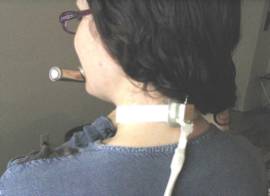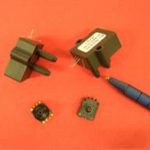
Description:
The extension of the musical possibilities based on the concept of augmented instruments has long been applied to flutes. However. The idea of using embouchure gestures as a way to control real-time digital audio effects has not yet been considered.
The embouchure technique is one of the most important skills developed by the flutist. This is because embouchure parameters play a significant role on the sound production mechanism of the flute. In fact, the style of flute schools is strongly defined by the way the embouchure technique is taught.
In the case of the Boehm flute, the most relevant parameters controlled by the embouchure are the air jet velocity and the air jet direction along the instrument axis. The air jet velocity basically controls the roughness of the sound. Higher jet velocities produce more turbulence and, therefore, higher contribution of noise in the sound content. The direction of the air jet along the flute axis acts to change its acoustic characteristics in several ways. The most important characteristic is the variation of the input impedance.
This work aims to present some possibilities of tracking embouchure variables. For that purpose, we have analysed several types of sensors, in terms of sensitivity, dimension, accuracy and price that can be used to track velocity and direction of air jets. The last step of the project was to develop a sensor system that could map embouchure parameters of the traditional Boehm flute and control digital audio effects, considering also the implementation of a haptic feedback actuator controlled by the embouchure gestures.
IDMIL Participants:
External Participants:
Andrey R. da Silva
Gary Scavone
Research Areas:
Funding:
Publications:
- da Silva, A., Wanderley, M. M., Scavone, G. (2005). On the Use of Flute Air Jet as a Musical Control Variable. In Proceedings of the 2005 International Conference on New Interfaces for Musical Expression (NIME 2005) (pp. 105-108). Vancouver, BC, Canada.

